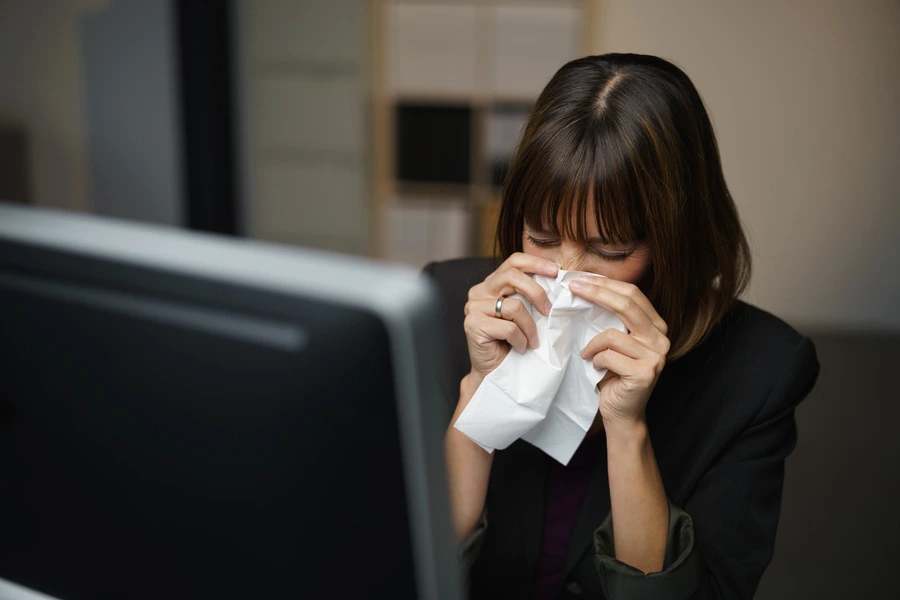
Staying Healthy During Winter: Why Workplace Hygiene Matters More Than Ever
As the winter months of November to February roll in, winter illnesses in the workplace—including colds, flu, coughs, and throat infections—surge across the UK, Germany, and much of Europe. This period sees an uptick in germs spreading quickly through close-contact spaces and communal surfaces. In the UK alone, approximately 185 million working days are lost annually to sickness, with winter being a particularly challenging time for maintaining health.
The Spread of Germs in the Winter Workplace
The office environment can amplify germ transmission due to factors such as crowded workspaces, shared surfaces, inadequate ventilation, and "presenteeism"—where employees attend work while sick. The presence of asymptomatic carriers, individuals who are infected but show no symptoms, also contributes to the silent spread of illness. Implementing effective workplace hygiene standards can make a substantial difference in reducing the spread of winter illnesses in the workplace.

Research highlights several alarming statistics about the winter spread of germs in workplace environments:
- Presenteeism: Around 50% of employees go to work while unwell, yet only 27% of facility managers send them home, potentially exposing others.
- Asymptomatic Spread: Up to 75% of seasonal flu infections are asymptomatic, which means germs can be transmitted without noticeable signs.
- Surface Contamination: A single infected employee can contaminate up to 50% of shared surfaces in an office, with germs transferring to the hands of 14 individuals from common touchpoints like door handles.
- Airborne Transmission: Infected droplets from sneezes can travel up to 8 metres, dispersing germs widely in shared spaces.
- Germ Density on Desks: Office desks can harbour 400 times more germs than a typical toilet seat.
These insights underscore the critical importance of robust hygiene protocols and flu season workplace policies to reduce the spread of illness in office and commercial settings. Businesses that prioritise cleanliness and adopt flu prevention tips for offices not only protect their workforce but also minimise sick days, boosting productivity and safeguarding public health.
A Call for Workplace Hygiene Standards
The British Cleaning Council (BCC) is advocating for national rules to set minimum workplace hygiene standards in UK workplaces. The council argues that mandatory standards would help prevent the spread of winter illnesses in the workplace and reduce the economic impact of sick days. This proposal aligns with a call from the Institute for Public Policy Research (IPPR) for healthier work environments, including improved workplace hygiene.
BCC Chair Delia Cannings emphasises the urgency of formal workplace hygiene standards:
“If we are considering how to make workplaces healthier, then cleanliness and hygiene must be part of that discussion. We've all been at work with a colleague who is coughing and sneezing and wondered if we will pick up their bug when we use the kettle or the microwave. Having mandatory, enforceable standards of cleaning and hygiene at work will help prevent this kind of sickness spreading and keep staff healthy and well.”
Currently, while employers have a legal obligation to provide clean workplaces, the BCC believes this duty falls short, leaving employees vulnerable to winter illnesses in the workplace. Formalised hygiene standards, with inspections potentially conducted by bodies such as the Health and Safety Executive (HSE), could ensure a healthier workforce and society.
Flu Prevention Tips for Offices
Many employers already support clean, safe work environments, often engaging professional cleaning services to maintain high hygiene standards. However, without clear national guidelines, some workplaces may overlook this critical responsibility. For employers and managers seeking to reduce the risk of winter illnesses in the workplace, here are a few flu prevention tips for offices:
- Ensure all employees have access to hand sanitisers and encourage regular use.
- Frequently clean and disinfect high-touch surfaces such as desks, door handles, and communal equipment.
- Improve ventilation systems to allow better airflow, especially in crowded or shared spaces.
Formal flu season workplace policies and flu prevention tips for offices can reinforce the importance of workplace cleanliness, ensuring a healthier workforce and saving the economy billions of pounds lost annually to sick days.
The message is clear: proactive measures to maintain workplace hygiene are essential for public health and economic well-being. Prioritising workplace hygiene standards and preventing sickness in the workplace is not only a health measure but also an economic necessity.
Stay Connected
Stay connected and be the first to know about our latest products, special offers, and exciting news:The Cleaning Blog
Want to learn more about cleaning? From the latest cleaning and hygiene news to handy how-to guides, why not check out our most popular blog categories.Stay Connected
Stay connected and be the first to know about our latest products, special offers, and exciting news:











